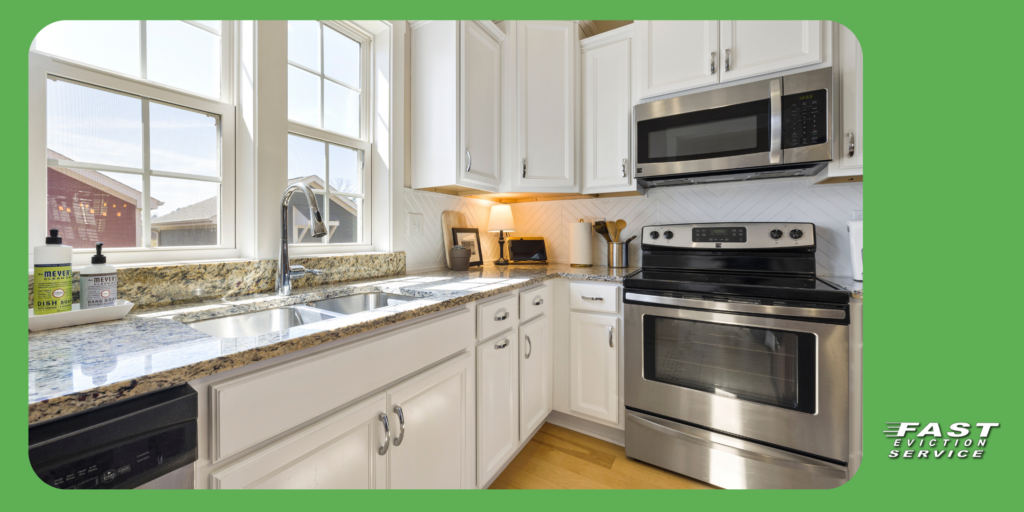Residential & Commercial Evictions | You are represented at all times by one of our California Eviction Attorneys | 1-800-686-8686 | intake@fastevict.com | Se habla español
AB 628: What Landlords Must Know About the New Stove & Fridge Mandate
For decades, many California tenants have been expected to bring their own refrigerators – a common practice that often blurred the line between “essential” and “optional” rental amenities. But beginning January 1, 2026, that will change. Assembly Bill 628 (AB 628) amends California’s habitability laws to require every rental unit to include a working stove and refrigerator.
This landmark update reshapes what it means for a unit to be legally habitable and introduces new compliance obligations for landlords statewide.
Key Takeaways
- AB 628 takes effect January 1, 2026, requiring a working stove and refrigerator in every California rental unit.
- Applies to new, amended, or renewed leases beginning on or after the effective date.
- Landlords must repair or replace broken or recalled appliances within 30 days.
- Certain exemptions apply to shared kitchens and specialized housing facilities.
- Noncompliance may render a unit “uninhabitable,” exposing landlords to habitability claims or rent withholding.

Table of Contents
- Background: How AB 628 Came to Be
- Key Provisions of AB 628
- Who Is Exempt from the Law
- Practical Steps for Landlord Compliance
- Financial and Legal Implications
- Tenant-Supplied Appliance Agreements
- How This Law Fits into California’s Habitability Standards
- Frequently Asked Questions
- Conclusion and Landlord Checklist
Background: How AB 628 Came to Be
Until now, California’s habitability laws under Civil Code § 1941.1 required basic utilities — heat, plumbing, and hot water — but not kitchen appliances. That gap left many tenants responsible for buying or maintaining costly items essential for daily living.
Recognizing the health, equity, and safety concerns of “fridge-less” or “stove-less” units, lawmakers introduced AB 628, sponsored by Assemblymember Tina McKinnor. The bill passed with strong tenant advocacy support, establishing that food storage and cooking capabilities are essential components of a habitable home.
Key Provisions of AB 628
Effective Date:
AB 628 takes effect on January 1, 2026, applying to all new, renewed, or amended rental agreements after that date.
Required Appliances:
- A working stove capable of safely cooking food.
- A working refrigerator capable of safely storing perishable food.
Maintenance and Repair:
Landlords must maintain appliances in good working order and repair or replace any defective or recalled units within 30 days of notice.
Legal Habitability:
A unit missing either appliance — or with a nonfunctional one — will be considered uninhabitable, meaning a tenant may have legal remedies under California’s habitability laws, such as repair-and-deduct or rent withholding.
Who Is Exempt from the Law
AB 628 recognizes that not all housing types operate the same. The following are exempt from the appliance mandate:
- Units with shared kitchens, such as some boarding houses or student housing.
- Permanent supportive housing or assisted living facilities governed by separate health or social service standards.
- Residential hotels or single-room occupancies (SROs) with communal kitchen setups.
Landlords of these properties should still confirm that shared appliances meet all health and safety codes, even if the individual unit exemption applies.
Practical Steps for Landlord Compliance
With the law’s implementation approaching, landlords should begin preparing well in advance.
A. Conduct an Appliance Audit
- List every unit under management.
- Note whether a refrigerator and stove are currently provided.
- Document the age, model, and condition of each appliance.
B. Update Lease Language
- Incorporate clear clauses stating that the unit includes landlord-provided appliances.
- Define maintenance responsibilities and access for repair.
C. Plan for Repairs and Replacement
- Establish a vendor list or service contract for appliance maintenance.
- Budget for potential replacements ahead of the January 2026 deadline.
D. Communicate with Tenants
- Send notice to current tenants explaining how the law affects upcoming renewals.
- Provide contact information for reporting appliance issues promptly.
Financial and Legal Implications
Financial Costs:
While adding appliances represents a new expense, compliance helps landlords avoid more serious financial risks such as rent abatement, tenant claims, or city code violations.
Legal Risks of Noncompliance:
- Tenants may argue that the unit is uninhabitable under Civil Code § 1941.1.
- Local housing departments could issue citations or penalties for violations.
- Courts may deny eviction actions if a landlord fails to maintain required habitability conditions.
Proactive compliance reduces risk, enhances property value, and improves tenant retention.
Tenant-Supplied Appliance Agreements
The law allows flexibility when tenants prefer to use their own refrigerator. However, several conditions apply:
- The tenant must agree in writing to supply the appliance.
- If the tenant later requests a landlord-provided refrigerator, the landlord has 30 days to install one.
- Landlords cannot condition tenancy on a tenant’s willingness to provide their own appliances.
Clear written documentation is critical to prevent disputes and maintain compliance.
How This Law Fits into California’s Habitability Standards
AB 628 adds to California’s evolving framework of habitability requirements that already include:
- Functioning plumbing and heating.
- Hot and cold running water.
- Safe electrical and gas systems.
- Weatherproofing and adequate sanitation.
With this update, cooking and food preservation join the list of basic necessities a landlord must supply for a rental unit to be legally habitable.
Frequently Asked Questions
Does AB 628 apply to existing leases?
Only to new, renewed, or amended leases on or after January 1, 2026. Existing leases remain unaffected until renewal.
Can I delay appliance repairs beyond 30 days?
No. The law specifically requires that repairs or replacements for recalled or broken appliances be completed within 30 days.
What qualifies as “good working order”?
Appliances must perform their intended functions safely and reliably — maintaining adequate heat (stove) and consistent cooling (refrigerator).
Can I charge tenants extra for new appliances?
You may not increase rent mid-lease, but rent adjustments upon renewal must comply with local rent control or AB 1482’s rent cap rules.
Are used appliances acceptable?
Yes, as long as they meet safety standards and operate properly at the start of tenancy.
Conclusion and Landlord Checklist
AB 628 represents a major shift in California’s approach to rental habitability. By recognizing stoves and refrigerators as essential living requirements, the law raises expectations for landlords — but also provides clarity and consistency for tenants statewide.
Landlord Compliance Checklist:
- Inventory existing units for appliance availability.
- Replace or repair any nonfunctional appliances.
- Update lease agreements to reflect new obligations.
- Notify tenants of any upcoming changes before renewal.
- Establish a maintenance plan for ongoing compliance.
Proactive preparation today ensures you’ll be ready — and compliant — when AB 628 takes effect on January 1, 2026.


